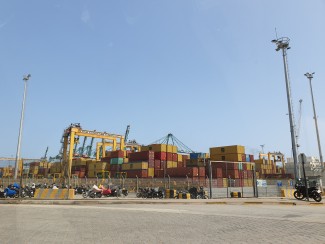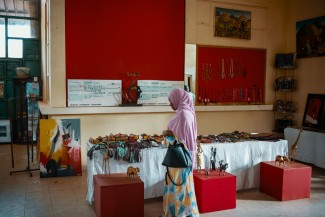Increasing efficiency leading to big gains
Nestled in the Indian Ocean, the Republic of Maldives is a small island state spanning roughly 298 square kilometres, comprised of about 1,190 islands grouped into 26 natural atolls.
The Maldives relies enormously on imports, with an approximately 15:1 import-to-export ratio in terms of trade value. On the one hand, the country needs to ensure that imports are cleared efficiently to ensure necessary supplies are available to its people. On the other, the Maldives is working diligently to improve its exports, which are mainly fisheries and fish products, as well as tourism.
In 2015, 97% of Maldivian merchandise exports were fishery products, of which 81% were fresh, chilled and frozen fish. Fish is of course highly perishable, and because of that, its export requires efficient customs and air transport services operations to ensure compliance with international export standards and to be competitive in the global market.
Trade facilitation has been thus critical for the country.
From traditional customs clearance to risk based and online
Prior to 2015, the environment for trade facilitation was uncertain for an extended period of time. The challenges were that cargo inspection procedures were not based on a proper risk management system. Instead of a system to target high-risk cargo for thorough physical inspection, almost all consignments were being inspected at the border. In addition, traders and brokers scattered across thousands of islands had to travel to major customs checkpoints to submit customs clearance documents. Thus, customs clearance took longer than necessary.
The introduction of risk-based clearance and an electronic system was the ideal solution.
At the time, the Enhanced Integrated Framework (EIF) helped the Maldives to adopt procedures and process changes in line with World Trade Organisation (WTO) agreements and World Customs Organisation recommendations. This includes the establishment of a modern trade information system, migration to the ASYCUDA World online platform for electronic customs processing, implementation of an integrated risk-based clearance system at Maldives Customs Services (MSC) and improved management of airport services.
In 2015, 97% of Maldivian merchandise exports were fishery products, of which 81% were fresh, chilled and frozen fish. Fish is of course highly perishable, and because of that, its export requires efficient customs and air transport services operations to ensure compliance with international export standards and to be competitive in the global market.
The online customs clearance system via ASYCUDA, along with the new, simplified process, has benefitted the island trading community, including importers, exporters, brokers, shipping lines, airlines, freight forwarders and other agents. They now have easy web-based access to one customs system and real-time information on the clearance of cargo, and they are connected with other regulatory agencies.
The system allows the submission of customs clearance documents online, replacing the need to travel thousands of miles between islands to major customs checkpoints. With the full migration to ASYCUDA World, the lead time for a trader to clear shipment has been reduced from 2-3 days to less than 24 hours. With the risk-based customs goods clearance, shipments are now assigned to green, yellow and red channels based on a risk assessment. All these measures have contributed to significant cost savings for businesses. The MSC is now the lead trade facilitation and border control agency, and over 1,000 customs officers, brokers, importers and exporters were trained.
Abdulla Shareef, the Deputy Commissioner of Customs, said, ''Migration to ASYCUDA World has been one of the major milestones achieved in recent years with regard to the modernisation of import and export processing in MCS. This has contributed immensely to successful implementation of online declaration processing and release. Also, ASYCUDA World has been advantageous in implementing online manifest processing and the recently introduced e-Gate pass system, which will further expedite examination and release of cargo. The new system will also be useful for the smooth transition to the Maldives National Single Window, with implementation underway with the Asian Development Bank.”
Better trade information system and inter-ministerial coordination
The work required coordination, institutional capacity and efforts from a variety of government agencies, including the Ministry of Economic Development, the Transport Authority, the Food and Drugs Authority, the Ministry of Defence and the agriculture division of the Ministry of Fisheries and Agriculture.
Instead of a system to target high-risk cargo for thorough physical inspection, almost all consignments were being inspected at the border. In addition, traders and brokers scattered across thousands of islands had to travel to major customs checkpoints to submit customs clearance documents.
The system allows the submission of customs clearance documents online, replacing the need to travel thousands of miles between islands to major customs checkpoints. With the full migration to ASYCUDA World, the lead time for a trader to clear his shipment has been reduced from 2-3 days to less than 24 hours.
The modernisation of the trade information system provided by the Ministry of Economic Development is an example of the country’s drive to improve trade facilitation. The migration of the national trade information system to a digital platform has transformed the quality and usefulness of the system. It now enables most business registrations and permits to be issued online and on the same day as well as expands service to all the atolls through networked systems based in atoll and island councils.
All of this helped to improve trade facilitation in the Maldives, and directly addressed critical service bottlenecks.
Towards a single window for all
As a result of all this increased efficiency and the new environment for paperless cross border trade, the Government is going a step further, working towards a one-stop service for trade and investment-related services known as the National Single Window. Building upon the success of the trade information system and ASYCUDA, the single window, with funding of US$10 million from the Asian Development Bank, will integrate the trade services provided by a multitude of government regulatory agencies under one IT platform.
The Maldives has made great strides in its development. In 2011, the country graduated from least developed country (LDC) status. Implementing trade facilitation measures such as customs reform, integrating its trade information system and the electronic processing of documents close on the heels of graduation meant that the country was able to maintain trade flows and stabilise their exports, noting that they had lost preferential market access and development aid.
The system allows the submission of customs clearance documents online, replacing the need to travel thousands of miles between islands to major customs checkpoints. With the full migration to ASYCUDA World, the lead time for a trader to clear shipment has been reduced from 2-3 days to less than 24 hours.
The accrued benefits from improving its trade processes and its customs clearance efficiency have enabled the Maldives to attract foreign direct investment (FDI) in strategic areas where preferences were removed after LDC graduation. The Maldives' merchandise exports increased from US$240 million in 2015 to US$339 million in 2018. Fish exports increased by 80% in 2018, particularly raw fish. Maldives fish is now positioned as a niche premium product with access to new market opportunities such as Turkey and Canada. FDI inflows have almost doubled, from US$298 million in 2015 to about US$552 million in 2018.
With the coming National Single Window, the outlook is even brighter.
Header image of students learning computer skills in Bhutan - ©Asian Development Bank via Flickr Creative Commons Attribution-NonCommercial-NoDerivs 2.0 Generic (CC BY-NC-ND 2.0) license.
If you would like to reuse any material published here, please let us know by sending an email to EIF Communications: eifcommunications@wto.org.



